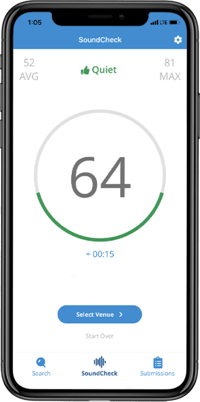Hearing in restaurants - How loud is too loud?
by Envoy Medical Staff Member, on February 2, 2024

Today, we have a larger number of older adults than any other recorded time in history; approximately 49 million Americans are 65 and older. The World Health Organization estimates that 60% of adults ages 60 and older will experience age-related hearing loss at a degree of moderate or greater. Despite the availability of treatments for hearing loss, a considerable portion of individuals choose not to seek help. A recent study conducted among older adults revealed that a mere 29.2% of those with hearing loss utilize hearing aids. If you were to ask individuals with hearing loss about their greatest difficulty, they would undoubtedly point out the challenge of comprehending conversations amidst background noise.
The nature of background noise varies by volume level and across different environments - it can be pleasant, like the soothing sound of ocean waves or the gentle hum of boats at the beach. However, it can also be unpleasant, such as the noise from nearby construction. The settings where background noise presents the most significant challenge for people with hearing loss are those that center around social interaction and necessitate effective communication. Interestingly, a recent survey on dining trends by Zagat revealed that restaurant noise ranked as the top complaint among all diners.
Background noise can trigger a phenomenon known as the Lombard effect, where individuals unconsciously raise their voices in noisy surroundings. When the noise surpasses the level of conversation, this heightened vocal effort, and the struggle to comprehend speech become even more demanding.
A study was conducted with the primary goal of understanding the effect of noise on vocal effort and speech intelligibility in a restaurant environment for individuals aged 60 and above, including those with and without hearing loss. Alongside this primary objective, the study also aimed to gauge participants' perception of communication difficulties and understand how this impacted their willingness to invest their time and money.
The results of the study showed senior customers can minimize the effort they exert in speaking and maximize their understanding of conversations in a restaurant setting when the background noise levels are below 50 dB; this was true for all participants, even those with moderate to severe hearing loss. Implementing this noise limit also effectively minimized any perceived disturbances in communication, which affected their willingness to spend time and money in a restaurant.
The goal of this study was to identify which level of background noise negatively affected communication for all older adults. Restaurants have a wide range of noise during hours of operation. Restaurant critics frequently carry sound level meters to evaluate noise levels, and when reviewing a restaurant online you will sometimes see a noise level rating, and or a scale showing when peak hours are. The long-term goal of the study was really to increase noise awareness in environments that are crucial for social life, creating more age-friendly and healthy communities.
SoundPrint, an app created by Gregory Scott, enables you to assess the sound level of different venues and share it with the community. It has been hailed as "Yelp for noise." The photo below shows the app's sound meter. Mr. Scott, who personally experiences hearing loss, developed this app after facing difficulties in finding restaurants that were manageable for him.

It's unlikely that restaurants will bring in acoustic engineers or reduce capacity to lower sound levels anytime soon there are steps you can take to improve your experience. The American Cochlear Implant Alliance (ACIA) suggests modifying the environment with the following tips:
- Sit in the brightest area of the restaurant.
- Sit in a corner of the restaurant with your back to the -corner.
- In a booth, try to sit next to the wall rather than facing out to the restaurant.
- If you have a “better ear,” sit with the better ear closest to everyone and further away from the noise.
- Sit away from the bar, kitchen, or any service stations in the restaurant.
- Avoid sitting next to large parties.
- Sit closest to those you wish to hear the most and consider sitting across from them to enhance lipreading or next to them if louder volume helps more.
Restaurants can be a demanding setting for everyone, especially those with hearing loss. However, with careful preparation, adjusting the environment to your advantage, and utilizing helpful tools, you can greatly enhance the chances of having engaging and meaningful conversations.


